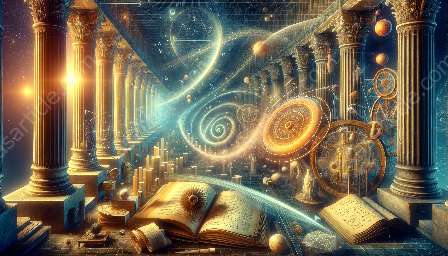Set theory, a fundamental concept in mathematics, has seen significant expansion and development over time. Understanding the history and relevance of set theory can provide insights into its applications in real-world problems and its impact on the field of mathematics and statistics. In this topic cluster, we will explore the evolution of set theory, its connections to the history of mathematics, and its broader implications in various mathematical and statistical contexts.
The Origins of Set Theory
Set theory, as a formalized mathematical discipline, has its roots in the late 19th and early 20th centuries. The early development of set theory can be attributed to mathematicians such as Georg Cantor, Richard Dedekind, and Bertrand Russell, who made significant contributions to its foundational principles and axioms. Cantor's work on the concept of infinite sets and cardinal numbers, in particular, laid the groundwork for the formalization of set theory as a distinct area of mathematical study.
Georg Cantor and the Continuum Hypothesis
Georg Cantor, often regarded as the founder of set theory, introduced the concept of the set as a collection of distinct objects and formalized the notions of equality, membership, and intersection of sets. His exploration of different types of infinities, such as countable and uncountable infinities, led to the formulation of the famous Continuum Hypothesis, which remains an unsolved problem in set theory to this day.
Development of Axiomatic Set Theory
In the early 20th century, the foundational crisis in mathematics prompted efforts to establish a rigorous set of axioms for set theory. Mathematicians such as Ernst Zermelo and Abraham Fraenkel made significant contributions to the development of axiomatic set theory, culminating in the Zermelo-Fraenkel set theory with the axiom of choice (ZFC), which became the standard framework for modern set theory.
Applications of Set Theory in Mathematics
Set theory serves as a foundational framework for various branches of mathematics, including algebra, analysis, and topology. The concepts of sets, functions, and relations are essential tools in mathematical reasoning and formalizing mathematical structures. Set-theoretic methods also play a crucial role in establishing the foundations of mathematical logic and model theory.
Set Theory and Real Analysis
In real analysis, the study of real numbers and continuous functions, set theory provides the basis for defining and exploring concepts such as open and closed sets, convergence, and continuity. The development of measure theory and integration, fundamental in modern analysis, relies heavily on set-theoretic constructions and notions.
Algebraic Set Theory and Category Theory
In algebra and category theory, set theory underpins foundational concepts such as groups, rings, and modules, as well as the categorical framework for studying mathematical structures and relationships. The use of categories and functors as organizing principles in mathematics is deeply rooted in set-theoretic foundations.
Set Theory in Statistics and Probability
Set theory plays a fundamental role in the formulation of probability theory and statistics. The study of sample spaces, events, and random variables relies on set-theoretic foundations, providing a rigorous framework for modeling and analyzing uncertainty and variation.
Probability Spaces and Measure Theory
In probability theory, the formalization of probability spaces and the development of measure-theoretic probability rely on set theory. The construction of sigma algebras, probability measures, and random processes are grounded in set-theoretic concepts, enabling the rigorous treatment of stochastic phenomena.
Statistical Inference and Set Operations
Statistical inference, including hypothesis testing and estimation, involves the manipulation and comparison of sets of data and parameters. Set operations, such as union, intersection, and complement, provide essential tools for formulating and analyzing statistical hypotheses and models, demonstrating the practical relevance of set theory in statistics.
Modern Developments and Challenges
Modern set theory continues to evolve, yielding both notable developments and unresolved challenges. The exploration of large cardinals, inner models, and descriptive set theory exemplifies the ongoing pursuit of deeper insights into the structure of sets and their properties. Moreover, foundational issues such as the continuum hypothesis and the axiom of choice remain open questions, sparking ongoing research and debate in the field.
Interdisciplinary Applications and Connections
Beyond its foundational role in mathematics and statistics, set theory has found interdisciplinary applications in fields such as computer science, theoretical physics, and philosophy. The study of computability, complexity, and formal systems draws heavily on set-theoretic concepts, highlighting the pervasive influence of set theory across diverse intellectual domains.
Philosophical Implications and Paradoxes
The study of set theory raises profound philosophical questions about the nature of mathematical objects, infinity, and the limits of formal systems. Paradoxes such as Russell's paradox and the liar paradox demonstrate the intricate nature of sets and their interplay with logical and linguistic concepts, prompting philosophical reflection and exploration.
Conclusion
In conclusion, the expansion of set theory reflects its enduring significance in the history of mathematics and its wide-ranging implications in contemporary mathematics and statistics. From its foundational principles and historical developments to its diverse applications and unresolved challenges, set theory stands as a pillar of mathematical reasoning and a cornerstone of rigorous reasoning across various fields of study.

